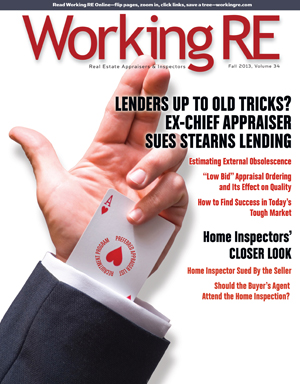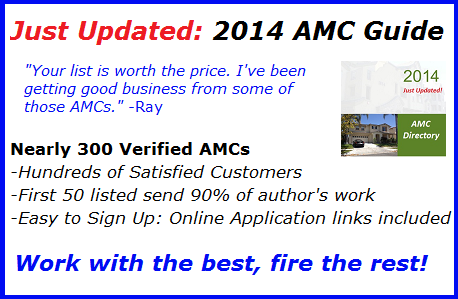 |
>> See Past News Editions >> Click to Print >> Upcoming Webinar: (recorded version available) – Mar 11th: Keeping off Fannie Mae’s New Appraiser “Black List” >> Slow? Get Busy: Work directly with clients, get paid full-fees and diversify your business. Click here to learn more. |
Editor’s Note: This Q&A comes from the Working RE/OREP webinar Top 5 Questions Asked of Appraisers and How to Answer, presented by Richard Hagar, SRA. Find the recorded webinar at WorkingRE.com/Webinars.
Top 5 Questions Asked of Appraisers and How to Answer
by Richard Hagar, SRA
Question: Where can we find information on the “correct” appraisal rebuttal process by banks, if the borrower does not agree with value?
Answer: As part of my answer, let me pose a question back to you: Would you need a rebuttal process if the appraised value was higher than what they thought? Likely not.
Now the better question: Why should there be any rebuttal process just because the value isn’t what the borrower thinks it should be? There is no reason to establish a rebuttal process since it appears that the borrower is attempting to influence the appraised value, which is illegal.
Exception to the above – If the borrower can identify incorrect information within the appraisal, the borrower should prepare a written document pointing out the errors and submit the document to the lender. The lender should review to determine if there is incorrect information. If there is, then the document should be forwarded to the appraiser who can determine if the errors are significant. If the appraiser determines that the errors are minor, then no further action is required. If in the appraiser’s opinion the errors are significant, then the appraiser should supply an addendum addressing the errors and impact on value.
The process is simple, every lender must review every appraisal for compliance with USPAP. If the appraisal passes the review, then make the loan. If the appraisal fails the review, order a new appraisal. The borrower’s opinion of value has no bearing on the appraisal process or value conclusion.
(story continues below)

(story continues)
Question: What would you recommend we do about real estate agents applying pressure?
Answer: Complain loud and often to numerous entities. Start with notifying your client (AMC and lender) of the problem. Next, complain to the real estate agent’s managing broker. Keep it polite, business-like and include a copy of the Dodd/Frank law that explains the illegality of their actions.
Question: Big Box AMC/lender always “suggests” additional comps once a report is completed and asks us to tell them why we did or did not use them. How should I deal with this?
Answer: Expect that you will always be providing additional service to this particular client. Increase your fees to compensate for the anticipated additional work. The appraiser’s job is to provide services to clients, and clients should pay for the appraiser’s time. My most common response to lenders like this is: We did consider these properties and found that they were not superior to the comparables used in the report. We use this response so often we made it a macro in our word processing program. Two clicks of a key and we are done and on to the next appraisal. Oh, did I also suggest- increase your fees?
(story continues)
Question: I did an appraisal a few months ago. The bank did not get their underwriting done in time for selling the loan. I also did a follow up inspection three months later for some repairs. The bank has now asked me to change my appraisal date to the final inspection date. Can I change my appraisal date?
Answer: No! What they really want is a new appraisal without paying for it. Have them order a new appraisal.
Question: When we looked at the current USPAP manual, 2012‑2013, under FAQs, page F‑62 & Question #135. The response says: “If the client does not require a more current effective date, USPAP would not mandate treating the request as a new assignment. However, if the client does require a more current effective date, the request must be treated as a new assignment.” Richard, why do you interpret this the way you do if the answer in USPAP says this?
Answer: Your question and the request by the client deals with far more than simply changing the date of the appraisal. The question concerned the buyer and seller changing the deal…. the sales price and the contract addendums that would go along with the changes. When the buyer and seller change the agreed upon sales price, they have altered the original agreement and, created a NEW contract. Appraisals must reflect the current agreement including all addenda. Think about the issues, if you have a new contract with a newer date:
- Your original appraisal order was dated before the current agreement. How is that possible? How would you explain the inconsistencies to an auditor?
- You pulled MLS and county data before the most recent contract date. Why would that happen? With inconsistent dates on the appraisal order, the original appraisal, instructions from the lender and, the most recent appraisal, it appears like you were trying to hide something. It looks suspicious, and you don’t need that if a government agency comes and inspects your work files.
- So what inspection date would you place on the appraisal? A date that occurred prior to the current contract date? Have you gone out and re-inspected? On the current appraisal, have you noted that you have performed services on this property within the prior X weeks?
- You have new information including the sales price. You must analyze all listing and sales information. Are you simply going to ignore the prior purchase and sale agreement and say nothing about it? Hopefully not.
- USPAP is designed as a generic guide for appraisers. If your client is a lender, then there are additional requirements that must be met. At a minimum, the requirements in addition to USPAP are: The Inter Agency Appraisal Guidelines and Fannie Mae’s Seller Guidelines. When I provided the answer in the Webinar, I considered these additional requirements as well.
Question: What about the client who, either reviews the appraisal or sends to the lender who reviews the appraisal, then asks the appraiser to provide additional comp(s) or to add a statement after delivery, without the intention to increase value, but simply to meet an underwriting condition, such as, “the well and septic distances meet FHA guidelines.” Is this acceptable and how should it be done, or is it not acceptable and how should the appraiser respond?
Answer: Depends on what you have in your engagement letter between the appraiser and the AMC/Lender. You do have a master engagement letter don’t you? How to handle issues and questions like this should be decided by the appraiser and client prior to accepting the assignment, not after. This way, appraisers can set their fees according to the work effort (Scope of Work). Yes, clients can ask for clarification or more information if the questions are related to a deficiency in the appraisal information. A problem regarding the septic system- how would the appraiser know if the well and septic distances meet FHA guidelines? Does the appraiser know the location of an underground septic tank? Does the appraiser know the location of the drain field? For most of the U.S., appraisers would not have a clue about the drain field location. I’ve talked to county health inspectors who have a copy of the As Built and even they don’t know the location. So, I’d be very careful before you go guaranteeing that you know about the location of that well and septic system. Why? Because if you are wrong, you could get sued and end up buying that house out of your personal savings. Ouch!
In the future, anticipate that this client will do this again. Increase your rates to cover the anticipated added work effort. Take my webinar, or live class, on Appraiser Independence and the Mandatory Reporting of USPAP Violations. In this live class/webinar we take time to go over the difference between deficiencies and influence.
(story continues below)

(story continues)
Question: Many banks require that their name be listed as the Lender/Client even though the order has been placed by an AMC. What is the best practice in this case?
Answer: Best answer according to USPAP: The client is the entity that orders the appraisal. As such, the AMC is your client and should be listed as such on the appraisal. Then make the lender as the additional intended user. Acceptable practice (not the best answer): indicate both the AMC and the lender as the Client. Common practice according to FNMA: place the lender’s name on the front page of the report, then list the AMC and the lender on the signature page.
Question: What can we do if we notice that volume falls off after we did not hit contract price for a client?
Answer: Ask the lender why but don’t expect a reliable answer. There’s not much you can do if a client does not hire you, that’s their business decision. Time to find another client.
Words from Fannie Mae regarding removal of an appraiser for cause: How does Section I.B.(8) [of the selling guide] impact how lenders may remove appraisers from a list of qualified appraisers?
Answer: Section I.B. (8) addresses the removal of an appraiser from a list of qualified appraisers in connection with influencing or attempting to influence the outcome of an appraisal. However, Section I.B. (8) does not preclude the management of appraiser lists for bona fide administrative reasons based on written, management‑approved policies. Also, Section VIII provides for lenders to have written policies and procedures implementing Appraiser Independence Requirements (AIR), including rules on appraiser independence, and to have mechanisms in place to report and discipline anyone who violates these policies and procedures.
Question: It is legal for an AMC to remove an appraiser’s name from their list if the appraiser does not accept their fees?
Answer: First of all, I’m not providing legal advice. What is legal or illegal is up to the government regulators and the court system. You can read numerous laws and you’ll have a good idea of what is illegal. Can one business not hire an appraiser because they charge more than others? Yes, welcome to America and free enterprise. Is it right for the AMC to pay ridiculously low fees? No! The solution is simple, improve the quality of your appraisals so you can find clients who pay more and stop working for clients that will not pay a reasonable fee.
Please understand, the people calling from the AMCs are usually lying to you about the fees and what others are charging. Weekly, we get AMCs that offer $200 for a residential appraisal. We say no. Often they come back and offer more. They are negotiating with you, except appraisers are unaware of the negotiation. We set our minimum fee at $600 and DO NOT work for less. And for $600, that house better be within close proximity of our office. Often we obtain $800 – $1,200 fees from AMCs (Seattle area). We’ve also been paid $5,000+ for complex waterfront properties.
In this order: A) Increase your skills, B) produce better quality appraisals and, C) increase your fees!!!
I strongly suggest taking the webinar on Appraiser Independence and the Mandatory Reporting of USPAP Violations at WorkingRE.com. Search the Hagar Institute website for classes, or ask us to hold a class in your area. The information you will receive will blow your mind and make your life easier. Finally, and I’m not sure but did I say… good appraisers should increase their fees!?
Notice: Mr. Hagar is not an attorney and CAN NOT PROVIDE LEGAL ADVICE OR COUNSEL. Nothing in this story shall be construed or interpreted as legal advice. Please seek the advice of your legal counsel. The contents of this document are for informational purposes only.
About the Author
Richard Hagar, SRA, is an appraiser, author and nationally-renowned instructor and consultant for banks, state and federal regulators and appraisers on federal and state compliance issues. Hagar has helped author numerous laws, regulations and guidelines at both state and federal level and is a nationally-recognized expert on appraisal/lender regulatory issues.
Upcoming Webinars:
March 11th: Keeping off Fannie Mae’s New Appraiser “Black List” – Presented by Richard Hagar, SRA
This webinar is designed to keep appraisers trouble-free. It describes the new AQM process and what to expect from Fannie Mae (FNMA).
We’re always listening: Send your story submission/idea to the Editor: dbrauner@orep.org.



by shahan
do i need to revisit the subject for 1004D value update?
-by Keith Robinson
Regarding who is the Client…..my logic says that THE LENDER is the entity ordering the appraisal. The AMC is only an agent. The lender hired the AMC to do some of its work. The AMC is not my client just because they placed the order. If USPAP says the AMC is my client and I agree, I am giving up my right to collect from the lender if the AMC goes broke or otherwise steals the appraisal money. The principal is responsible for the acts of its agent, according to 100+ years of rule of law in this country. Of course, this time-honored rule of law has been trashed by a court which apparently was bought off or intimidated by Chase, and let them off the hook for $millions owed to appraisers. There’s a lot of useless pap in USPAP. (Otherwise, I think your article is right on — particularly the comments about fees).
-by Carrie@Silver.com
The residential appraisal industry will stay in-the-tank until two things happen. No seminars, change of business models, etc. will cure the malignancy until AMCs are forced to “break-out the fee they get” and “the fee we get” on the HUD1 (itemized closing statement) and broadcast orders are eliminated. When you can “auction off” every appraisal to 2,000 willing takers at the touch of a button, no industry can survive. This is the negative aspect of technology.
-by Free Speech
“The process is simple, every lender must review every appraisal for compliance with USPAP.”
-Most of them don’t even know what USPAP is.
Good article, however.
by Bobb
It would be no surprise that a lot of appraisers bail this business now. With the added scrutiny, a lot less folks will be able to cut it and will feel very vulnerable. For those who are skilled enough, yes, Richard, start spreading the news that your fees are going up now so you don’t get stuck in the restrained box of ‘customary and ordinary’ since this is a whole new ball game-I retired as I am tired of the Govt. meddling and the lenders peddling! Aloha to all. See ya in Hawaii soon. and mahalo for the good news, Richard.
-by Jim Woodring
Regarding question 4, why can’t the lender just order a 1004D Appraisal Update Report instead of a full new appraisal?
-